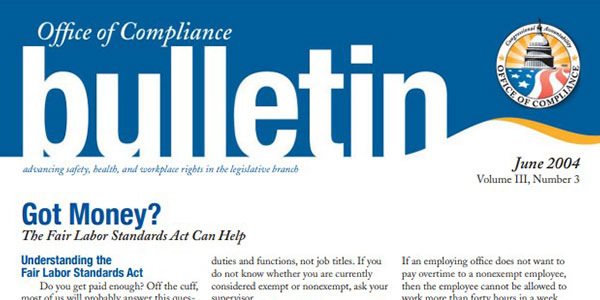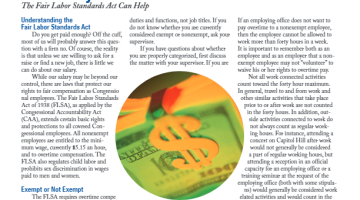The Fair Labor Standards Act Can Help
Understanding the Fair Labor Standards Act
Do you get paid enough? Off the cuff most of us will probably answer this question with a firm no. Of course, the reality is that unless we are willing to ask for a raise or find a new job, there is little we can do about our salary.
While our salary may be beyond our control, there are laws that protect our rights to fair compensation as Congressional employees. The Fair Labor Standards Act of 1938 (FLSA), as applied by the Congressional Accountability Act (CAA), extends certain basic rights and protections to all covered Congressional employees. All nonexempt employees are entitled to the minimum wage, currently $5.15 an hour, and to overtime compensation. The FLSA also regulates child labor and prohibits sex discrimination in wages paid to men and women.
Exempt or Not Exempt
The FLSA requires overtime compesation for certain covered employees who work more than a forty hour workweek. Such employees are called “nonexempt employees.” Covered employees who work in a bona fide executive, administrative, or professional capacity and who meet defined criteria are not required to be paid overtime, and are called “exempt employees.”
The categorization as exempt or nonexempt is not entirely at the discretion of an employer. There are very specific criteria as to who may or may not be considered an exempt employee, and the determination depends on actual job duties and functions, not job titles. If you do not know whether you are currently considered exempt or nonexempt, ask your supervisor.
If you have questions about whether you are properly categorized, first discuss the matter with your supervisor. If you are still unclear about exempt-versus-nonexempt criteria and your status or want additional information, visit our website, www.compliance.gov. You may also contact the Office of Compliance.

